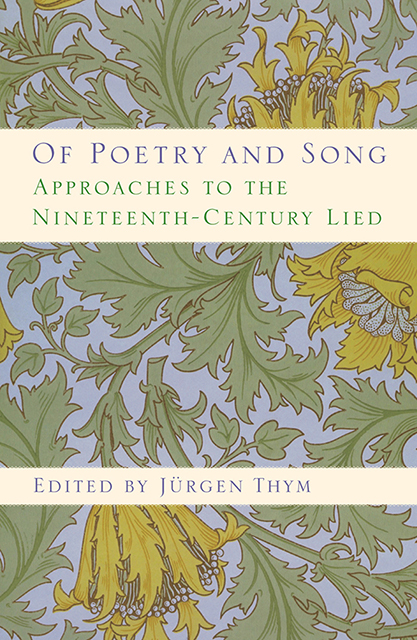Chapter Four - Hugo Wolf’s Ghazal Settings from “Das Schenkenbuch” of Goethe’s West-östlicher Divan
Published online by Cambridge University Press: 02 March 2023
Summary
Apart from notable exceptions such as the “Mignon” and “Harper” songs, Hugo Wolf's Goethelieder have never achieved the widespread success, either among critics or the general public, of his Mörike or Eichendorff settings. Even less successful are his seventeen settings from Goethe's rather esoteric amalgamation of oriental and occidental idioms in the more than two hundred poems of his West-östlicher Divan. The fact that this wide-ranging cycle is in fact the product of an aged poet's rejuvenated inspiration rather than the irreverent jottings of indiscreet senility has become clear to the most recent generation of German scholars.
Not nearly so clear is the musicological consensus; yet it can readily be shown that Wolf's musical interpretation of selected Divan poems richly complements and, at best, even enhances Goethe's deceptively simple verses. To show this, however, one must closely examine the structures of the text as poetry and the music as more than mere accompaniment or self-contained statement of mood. While all five of Wolf's “Schenkenbuch” songs reveal fascinating correspondences between poetic and musical structure, the two settings in which the composer grappled with Goethe's emulation of the Persian ghazal form provide the greatest novelty and clearest perspective on Wolf's considerable accomplishment in synthesizing occidental and oriental textures and values.
When Goethe “discovered” Persian poetry through Hafiz and in Hammer-Purgstall's translation in 1814, it seemed to many contemporaries to be something anachronistic, strange, and certainly irrelevant to the literary mainstream. But it is a striking fact that in 1889, when Hugo Wolf expressed a predilection for Persian motives in praise of wine, love, and song by setting Goethe's “Schenkenbuch” poems—again seeming to indulge almost perverse and very private preferences or preoccupations—he was in fact doing precisely what his contemporaries in England, the Pre-Raphaelites, considered vital to their poetic existence: they were celebrating the identical Anacreontic themes of love, wine, and music as expressed in Persian poetry and doing so through translation. What Hammer-Purgstall had been to Goethe, to be sure, Edward Fitzgerald was to the Pre-Raphaelites; from 1859 through 1889 at least five published versions of Omar Khayyám's Rubáiyát appeared in “transmogrification” (Fitzgerald's jocular coinage); these inspired Ernest Dowson—among other Pre-Raphaelites—to indulge in a very “Divanesque” and decadent call “for madder music and for stronger wine.”
- Type
- Chapter
- Information
- Of Poetry and SongApproaches to the Nineteenth-Century Lied, pp. 89 - 110Publisher: Boydell & BrewerPrint publication year: 2010



